Here are some events that happened on January 24th. It could be an event or a person that died or was born on that day
1712 Born: Frederick the Great, Prussian king (d. 1786)
Frederick II (German: Friedrich II.; 24 January 1712 – 17 August 1786) ruled the Kingdom of Prussia from 1740 until 1786, the longest reign of any Hohenzollern king at 46 years. His most significant accomplishments during his reign included his military victories, his reorganization of Prussian armies, his patronage of the arts and the Enlightenment and his success in the Seven Years' War. Frederick was the last Hohenzollern monarch titled King in Prussia and declared himself King of Prussia after achieving sovereignty over most historically Prussian lands in 1772. Prussia had greatly increased its territories and became a leading military power in Europe under his rule. He became known as Frederick the Great (German: Friedrich der Große) and was nicknamed Der Alte Fritz ("Old Fritz") by the Prussian people and eventually the rest of Germany.
In his youth, Frederick was more interested in music and philosophy than the art of war. Nonetheless, upon ascending to the Prussian throne he attacked Austria and claimed Silesia during the Silesian Wars, winning military acclaim for himself and Prussia. Toward the end of his reign, Frederick physically connected most of his realm by acquiring Polish territories in the First Partition of Poland. He was an influential military theorist whose analysis emerged from his extensive personal battlefield experience and covered issues of strategy, tactics, mobility and logistics.
Frederick was a proponent of enlightened absolutism. He modernized the Prussian bureaucracy and civil service and pursued religious policies throughout his realm that ranged from tolerance to segregation. He reformed the judicial system and made it possible for men not of noble status to become judges and senior bureaucrats. Frederick also encouraged immigrants of various nationalities and faiths to come to Prussia, although he enacted oppressive measures against Polish Catholic subjects in West Prussia. Frederick supported arts and philosophers he favored as well as allowing complete freedom of the press and literature. Most modern biographers agree that Frederick was primarily homosexual. Frederick is buried at his favorite residence, Sanssouci in Potsdam. Because he died childless, Frederick was succeeded by his nephew Frederick William II.
Nearly all 19th-century German historians made Frederick into a romantic model of a glorified warrior, praising his leadership, administrative efficiency, devotion to duty and success in building up Prussia to a great power in Europe. Historian Leopold von Ranke was unstinting in his praise of Frederick's "heroic life, inspired by great ideas, filled with feats of arms ... immortalized by the raising of the Prussian state to the rank of a power". Johann Gustav Droysen was even more extolling. Frederick remained an admired historical figure through Germany's defeat in World War I. The Nazis glorified him as a great German leader pre-figuring Adolf Hitler, who personally idolized him.
Associations with him became far less favorable after the fall of the Nazis, largely due to his status as one of their symbols.
However, historians in the 21st century now again view Frederick as one of the finest generals of the 18th century, one of the most enlightened monarchs of his age and a highly successful and capable leader who built the foundation for the Kingdom of Prussia to become a great power that would contest the Austrian Habsburgs for leadership among the German states.
German stamps depicting Frederick the Great
1859 – The United Principalities of Moldavia and Wallachia (later named Romania) is formed as a personal union under the rule of Domnitor Alexandru Ioan Cuza.
The United Principalities of Moldavia and Wallachia was the personal union of the Principality of Moldavia and the Principality of Wallachia, formed on 5 February [O.S. 24 January] 1859 when Alexandru Ioan Cuza was elected as the Domnitor (Ruling Prince) of both principalities, which were autonomous but still vassals of the Ottoman Empire. On 3 February [O.S. 22 January] 1862, Moldavia and Wallachia formally united to create the Romanian United Principalities, the core of the Romanian nation state.
In February 1866, Prince Cuza was forced to abdicate and go into exile by a political coalition led by the Liberals; the German Prince Karl of Hohenzollern-Sigmaringen was offered the Throne and, on 22 May [O.S. 10 May] 1866 he entered Bucharest for the first time. In July the same year, a new constitution came into effect, giving the country the name of Romania; internationally, this name was used only after 1877, since at the time the foreign policy of the state was drafted by the Ottomans. Nominally, the new state remained a vassal of the Ottoman Empire. However, by this time the suzerainty of the Sublime Porte had become a legal fiction. Romania had its own flag and anthem, and conducted its own foreign policy. From 1867, it had its own currency as well.
On 22 May [O.S. 10 May] 1877, Romania proclaimed itself fully independent; the declaration was read in parliament the previous day. Four years later, the 1866 constitution was modified so the Romania became a kingdom, on 22 May [O.S. 10 May] 1881, Domnitor Carol I was crowned as the first King of Romania.
For its triple symbolic meaning, the date of May 10 was celebrated as Romania's National Day until 1948, when Romanian and Soviet Communists installed the republic via coup d'etat on December 30, 1947.
Some of the earliest stamps issued by Moldavia and Wallachia
1965 Died: Winston Churchill, English colonel and politician, Prime Minister of the United Kingdom, Nobel Prize laureate (b. 1874)
Sir Winston Leonard Spencer Churchill (30 November 1874 – 24 January 1965) was a British statesman, army officer, and writer. He was Prime Minister of the United Kingdom from 1940 to 1945, when he led the country to victory in the Second World War, and again from 1951 to 1955. Apart from two years between 1922 and 1924, Churchill was a Member of Parliament (MP) from 1900 to 1964 and represented a total of five constituencies. Ideologically an economic liberal and imperialist, he was for most of his career a member of the Conservative Party, as leader from 1940 to 1955. He was a member of the Liberal Party from 1904 to 1924.
Of mixed English and American parentage, Churchill was born in Oxfordshire to a wealthy, aristocratic family. He joined the British Army in 1895 and saw action in British India, the Anglo-Sudan War, and the Second Boer War, gaining fame as a war correspondent and writing books about his campaigns. Elected a Conservative MP in 1900, he defected to the Liberals in 1904. In H. H. Asquith's Liberal government, Churchill served as President of the Board of Trade and Home Secretary, championing prison reform and workers' social security. As First Lord of the Admiralty during the First World War, he oversaw the Gallipoli Campaign but, after it proved a disaster, he was demoted to Chancellor of the Duchy of Lancaster. He resigned in November 1915 and joined the Royal Scots Fusiliers on the Western Front for six months. In 1917, he returned to government under David Lloyd George and served successively as Minister of Munitions, Secretary of State for War, Secretary of State for Air, and Secretary of State for the Colonies, overseeing the Anglo-Irish Treaty and British foreign policy in the Middle East. After two years out of Parliament, he served as Chancellor of the Exchequer in Stanley Baldwin's Conservative government, returning the pound sterling in 1925 to the gold standard at its pre-war parity, a move widely seen as creating deflationary pressure and depressing the UK economy.
Out of office during the 1930s, Churchill took the lead in calling for British rearmament to counter the growing threat of militarism in Nazi Germany. At the outbreak of the Second World War he was re-appointed First Lord of the Admiralty. In May 1940, he became Prime Minister, replacing Neville Chamberlain. Churchill oversaw British involvement in the Allied war effort against the Axis powers, resulting in victory in 1945. After the Conservatives' defeat in the 1945 general election, he became Leader of the Opposition. Amid the developing Cold War with the Soviet Union, he publicly warned of an "iron curtain" of Soviet influence in Europe and promoted European unity. Re-elected Prime Minister in 1951, his second term was preoccupied with foreign affairs, especially Anglo-American relations and, despite ongoing decolonisation, preservation of the British Empire. Domestically, his government emphasised house-building and developed a nuclear weapon. In declining health, Churchill resigned as Prime Minister in 1955, although he remained an MP until 1964. Upon his death in 1965, he was given a state funeral.
Widely considered one of the 20th century's most significant figures, Churchill remains popular in the UK and Western world, where he is seen as a victorious wartime leader who played an important role in defending Europe's liberal democracy against the spread of fascism. Also praised as a social reformer and writer, among his many awards was the Nobel Prize in Literature. Conversely, he has been criticised for some wartime events, notably the 1945 bombing of Dresden, and for his imperialist views and comments on race.
Stamps from various countries depicting Churchill
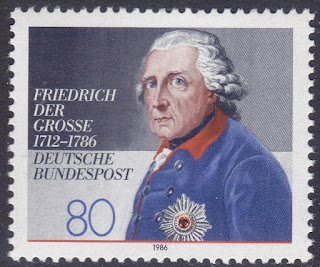


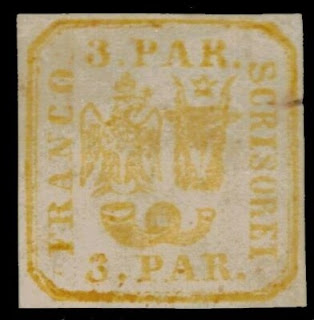
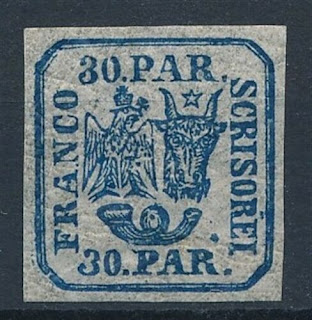
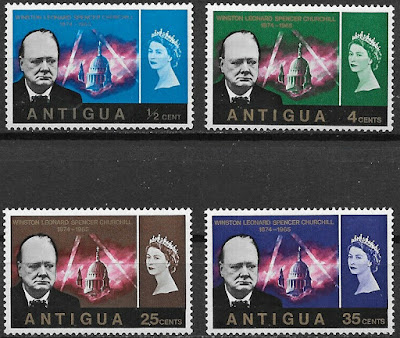


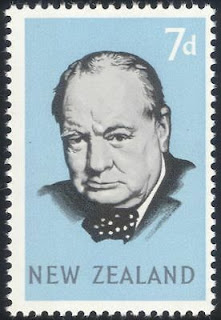
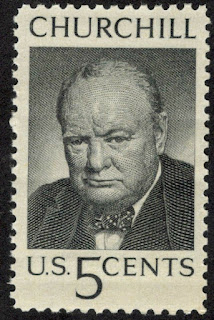
No comments:
Post a Comment